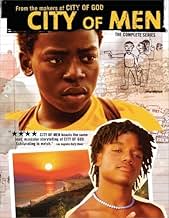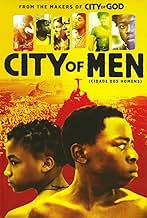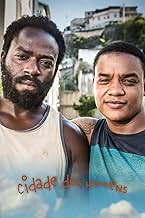Ajouter une intrigue dans votre langueA realistic yet humorous look at the lives of Laranjinha and Acerola, two friends who live adventurous and dangerous lives in a Rio de Janeiro slum.A realistic yet humorous look at the lives of Laranjinha and Acerola, two friends who live adventurous and dangerous lives in a Rio de Janeiro slum.A realistic yet humorous look at the lives of Laranjinha and Acerola, two friends who live adventurous and dangerous lives in a Rio de Janeiro slum.
- Récompenses
- 3 victoires et 3 nominations au total
Parcourir les épisodes
Adriana Rodrigues
• 2017
Jefferson Brasil
• 2017
Dja Marthins
• 2017
Adriano Peterman
• 2017
Aléssio Abdon
• 2017
Pedro Maya
• 2017
Avis à la une
Cidade dos Homens belongs to Cidade de Deus' world. However, its not such well done stuff. However, it shows the reality with a more realistic approach. If you liked Cidade de Deus, try to see this mini, but don't expect such a gorgeous creation.
First things first, this series is not a continuation of the story of the film City Of God, but covers similar themes. Many of the actors are in both (Douglas Silva, for example played Ze Pequeno in the film, and plays Acerola, one of the two protagonists in the series). No matter what anyone says, the series will always be compared to film.
But I feel that the series explores the favela culture in far more depth than the film. One particularly good episode is 'Uólace and João Victor', where Laranjinha's troubles living in the favela are compared to those of a middle class 'playboy' Joao Victor. The episode explores their problems with girls, crime, friends, parents, food, school, race etc. and ultimately concludes that their adolescent lives really aren't all that different, even though their surroundings are. There is a really nice scene at the end of the episode when one is walking the streets, and the other is looking out the window. They look at each other and both think "That boy looks so lonely".
Many of the episodes take place out of the favela, bringing a whole new aspect to the culture. How are black/favela kids perceived by the rest of society? What is school like for them? Is it even possible for them get a decent education? Are they all thieves and bandits, or just hungry and desperate? Say one wants to leave the favela drug business, is it possible for them to leave and get a 'normal' job? Although inevitably glamourised somewhat, the series is a great look into Rio life, shot beautifully with many interesting techniques used - montage, voice-over, animation, pans, subjective camera-work are all used to recreate the lifestyle. Another ace scene is in the final episode when one bandit is running from the police, dodging in and out of alleys in the favela. The camera switches to a natural, overhead view, and we see what the bandit sees, as he glances down possible routes to make his escape.
I think that the most interesting scene is when there is a particularly violent event, and the shot merges into real life interviews with the kids about their lives in the favela. As they brag about various violent scenes they have witnessed in real life, it becomes clear that the brutality in the series is not all that far fetched. Many of the young actors in the film and series were picked from the favela by the director and just told to act how they would naturally when presented with, say, a drug deal or a murder.
The series is into is fourth of fifth season in Brazil, so here's hoping for an international release soon...
But I feel that the series explores the favela culture in far more depth than the film. One particularly good episode is 'Uólace and João Victor', where Laranjinha's troubles living in the favela are compared to those of a middle class 'playboy' Joao Victor. The episode explores their problems with girls, crime, friends, parents, food, school, race etc. and ultimately concludes that their adolescent lives really aren't all that different, even though their surroundings are. There is a really nice scene at the end of the episode when one is walking the streets, and the other is looking out the window. They look at each other and both think "That boy looks so lonely".
Many of the episodes take place out of the favela, bringing a whole new aspect to the culture. How are black/favela kids perceived by the rest of society? What is school like for them? Is it even possible for them get a decent education? Are they all thieves and bandits, or just hungry and desperate? Say one wants to leave the favela drug business, is it possible for them to leave and get a 'normal' job? Although inevitably glamourised somewhat, the series is a great look into Rio life, shot beautifully with many interesting techniques used - montage, voice-over, animation, pans, subjective camera-work are all used to recreate the lifestyle. Another ace scene is in the final episode when one bandit is running from the police, dodging in and out of alleys in the favela. The camera switches to a natural, overhead view, and we see what the bandit sees, as he glances down possible routes to make his escape.
I think that the most interesting scene is when there is a particularly violent event, and the shot merges into real life interviews with the kids about their lives in the favela. As they brag about various violent scenes they have witnessed in real life, it becomes clear that the brutality in the series is not all that far fetched. Many of the young actors in the film and series were picked from the favela by the director and just told to act how they would naturally when presented with, say, a drug deal or a murder.
The series is into is fourth of fifth season in Brazil, so here's hoping for an international release soon...
I've just seen the first two episodes after buying the UK edition of this amazing mini-series. Of course I watched the Film "City Of God" and thats how I came to hear of this. For those who say the series isn't as good as the film I don't think it should be compared to the film...sure it shares many things with the film, specially the humour and cinematic style but lets judge this on its own as it's NOT a film.
The music is excellent, the acting (especially Douglas Silva) is superb, and the cinematography is beautiful. The two episodes I've seen are brilliantly structured and I can't wait to see the rest...I only wish there were more episodes in each series (only 4 in the 1st and 5 in the 2nd). A pleasant surprise is the occasional computer animated sequence based on the narrative or what Silva's character is imagining..these are implemented so well that they really add to the atmosphere and feel of the show, and they're done with great humour.
For anyone who saw the film and is worried this won't be as exciting or "complete" forget your worries. I've only watched the first 2 episodes and my "City of God" thirst has already been quenched. But it's not all fun, and yes this is, like the film, also so memorable because it seems quite realistic and it grabs at the heart. You feel like you are getting a real taste of Rio slum life from a kids perspective, and although the overall experience is enjoyable I also find it quite sad and moving at times. Sometimes Silva's acting feels so real I wonder if he's not actually remembering real life problems he's run into on the streets. There's a wonderful moment in the first episode after he's been mugged where his character (Acerola) starts crying, and for a brief moment glimpses at the camera. To me its not like a "save the children" moment..it really is a "you see what I have to deal with!?" kind of moment, and for me it works superbly.
So my advice is if in your TV series' you like fresh ideas, great acting, original presentation, quality filming, addictive story lines, and some wicked humour then watch City Of Men.
The music is excellent, the acting (especially Douglas Silva) is superb, and the cinematography is beautiful. The two episodes I've seen are brilliantly structured and I can't wait to see the rest...I only wish there were more episodes in each series (only 4 in the 1st and 5 in the 2nd). A pleasant surprise is the occasional computer animated sequence based on the narrative or what Silva's character is imagining..these are implemented so well that they really add to the atmosphere and feel of the show, and they're done with great humour.
For anyone who saw the film and is worried this won't be as exciting or "complete" forget your worries. I've only watched the first 2 episodes and my "City of God" thirst has already been quenched. But it's not all fun, and yes this is, like the film, also so memorable because it seems quite realistic and it grabs at the heart. You feel like you are getting a real taste of Rio slum life from a kids perspective, and although the overall experience is enjoyable I also find it quite sad and moving at times. Sometimes Silva's acting feels so real I wonder if he's not actually remembering real life problems he's run into on the streets. There's a wonderful moment in the first episode after he's been mugged where his character (Acerola) starts crying, and for a brief moment glimpses at the camera. To me its not like a "save the children" moment..it really is a "you see what I have to deal with!?" kind of moment, and for me it works superbly.
So my advice is if in your TV series' you like fresh ideas, great acting, original presentation, quality filming, addictive story lines, and some wicked humour then watch City Of Men.
If you have seen the «City of God» movie... and you really enjoy it... You just have to run and see this mini-series.
With the same actors, the same and other directors, and with the same landscape (Brazilian «Favelas»), Cidade dos Homens is a great mini-series, that show us how is the live, dead, living, love, fun, sadness on the Brazilian «Favelas».
Another interesting thing about this young actors, is that most of them, actually were young kids that used to live on the streets of Rio de Janeiro, because of this are now having a normal live, with other perspectives. I'm sure most of them will have a great future on the movies or cinema works.
Great Job... I'm only sad because it ended... ;-)
With the same actors, the same and other directors, and with the same landscape (Brazilian «Favelas»), Cidade dos Homens is a great mini-series, that show us how is the live, dead, living, love, fun, sadness on the Brazilian «Favelas».
Another interesting thing about this young actors, is that most of them, actually were young kids that used to live on the streets of Rio de Janeiro, because of this are now having a normal live, with other perspectives. I'm sure most of them will have a great future on the movies or cinema works.
Great Job... I'm only sad because it ended... ;-)
This is a powerful 19-part fictional series, based on real events and characters, that is ingeniously filmed on the streets, beaches and the notorious favelas of Rio de Janeiro.
'City of Men' recounts the many experiences (some very funny) of two teenagers from the slums trying to remain reasonably honest while poverty, racism, gang warfare and police brutality surround them. The close friendship of the two teenagers is brought to the screen with rare intensity by Darlan Cunha as Laranjinha, a disconnected but charismatic and streetwise figure, and the often bewildered, likable and always horny ('I don't want to die a virgin') Douglas Silva as Acerola. Both of these boys are not trained actors, and were 14 years old when the series started in 2002 (it ended in 2006). It's fascinating to watch them work.
The series is bathed in brilliant day-time colour and ominous night-time danger. People in this film live close to the edge. Murder is an everyday event.
The only problem I had with the series is the rapid-fire quick cuts and the shaky hand-held cameras. If this style doesn't bother you, sit tight and enjoy the ride. For me, the sizzle and the dazzle are often unnecessary and distracting. Too much focus (literally) on style, and the messages of the film are blurred somewhat because of it.
'City of Men' recounts the many experiences (some very funny) of two teenagers from the slums trying to remain reasonably honest while poverty, racism, gang warfare and police brutality surround them. The close friendship of the two teenagers is brought to the screen with rare intensity by Darlan Cunha as Laranjinha, a disconnected but charismatic and streetwise figure, and the often bewildered, likable and always horny ('I don't want to die a virgin') Douglas Silva as Acerola. Both of these boys are not trained actors, and were 14 years old when the series started in 2002 (it ended in 2006). It's fascinating to watch them work.
The series is bathed in brilliant day-time colour and ominous night-time danger. People in this film live close to the edge. Murder is an everyday event.
The only problem I had with the series is the rapid-fire quick cuts and the shaky hand-held cameras. If this style doesn't bother you, sit tight and enjoy the ride. For me, the sizzle and the dazzle are often unnecessary and distracting. Too much focus (literally) on style, and the messages of the film are blurred somewhat because of it.
Le saviez-vous
- AnecdotesThis series is based on the short Palace II (2000) in which Darlan Cunha played Acerola and Douglas Silva played Laranjinha. In this series, Cunha played Laranjinha and Silva played Acerola.
- ConnexionsFeatured in La cité des hommes (2007)
- Bandes originalesO Vencedor
Performed by Los Hermanos
Meilleurs choix
Connectez-vous pour évaluer et suivre la liste de favoris afin de recevoir des recommandations personnalisées
- How many seasons does City of Men have?Alimenté par Alexa
Détails
- Date de sortie
- Pays d’origine
- Site officiel
- Langue
- Aussi connu sous le nom de
- City of Men
- Lieux de tournage
- Sociétés de production
- Voir plus de crédits d'entreprise sur IMDbPro
Contribuer à cette page
Suggérer une modification ou ajouter du contenu manquant

Lacune principale
By what name was La cité des hommes (2002) officially released in Canada in English?
Répondre




























